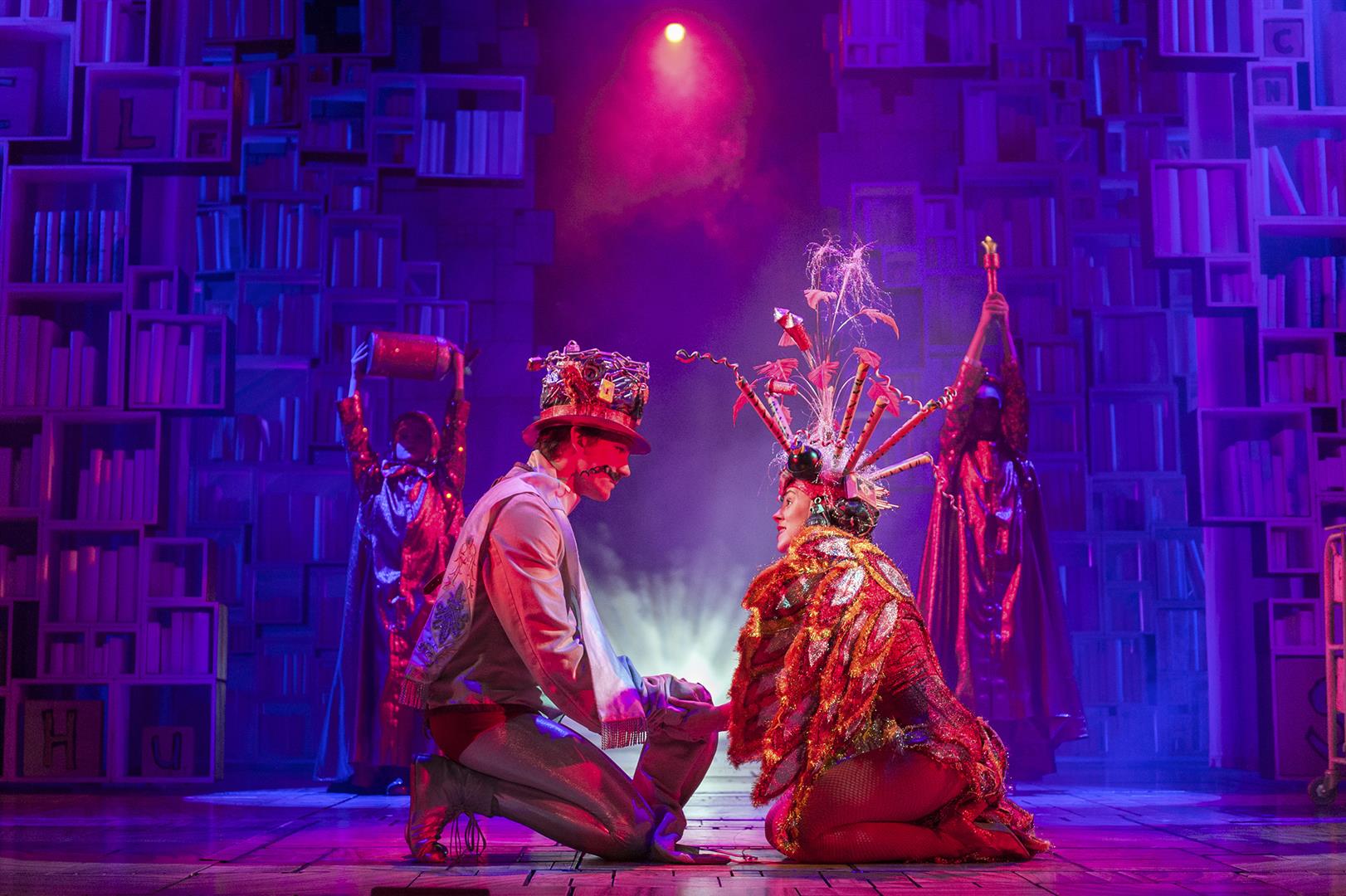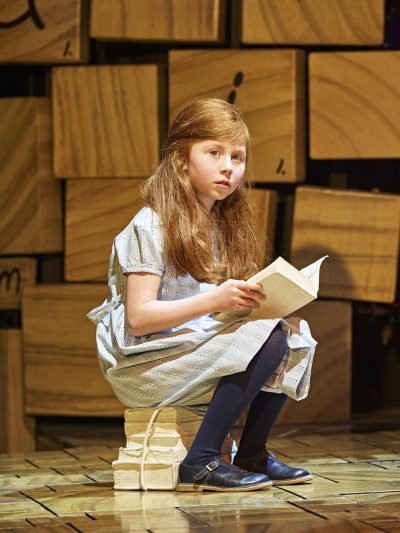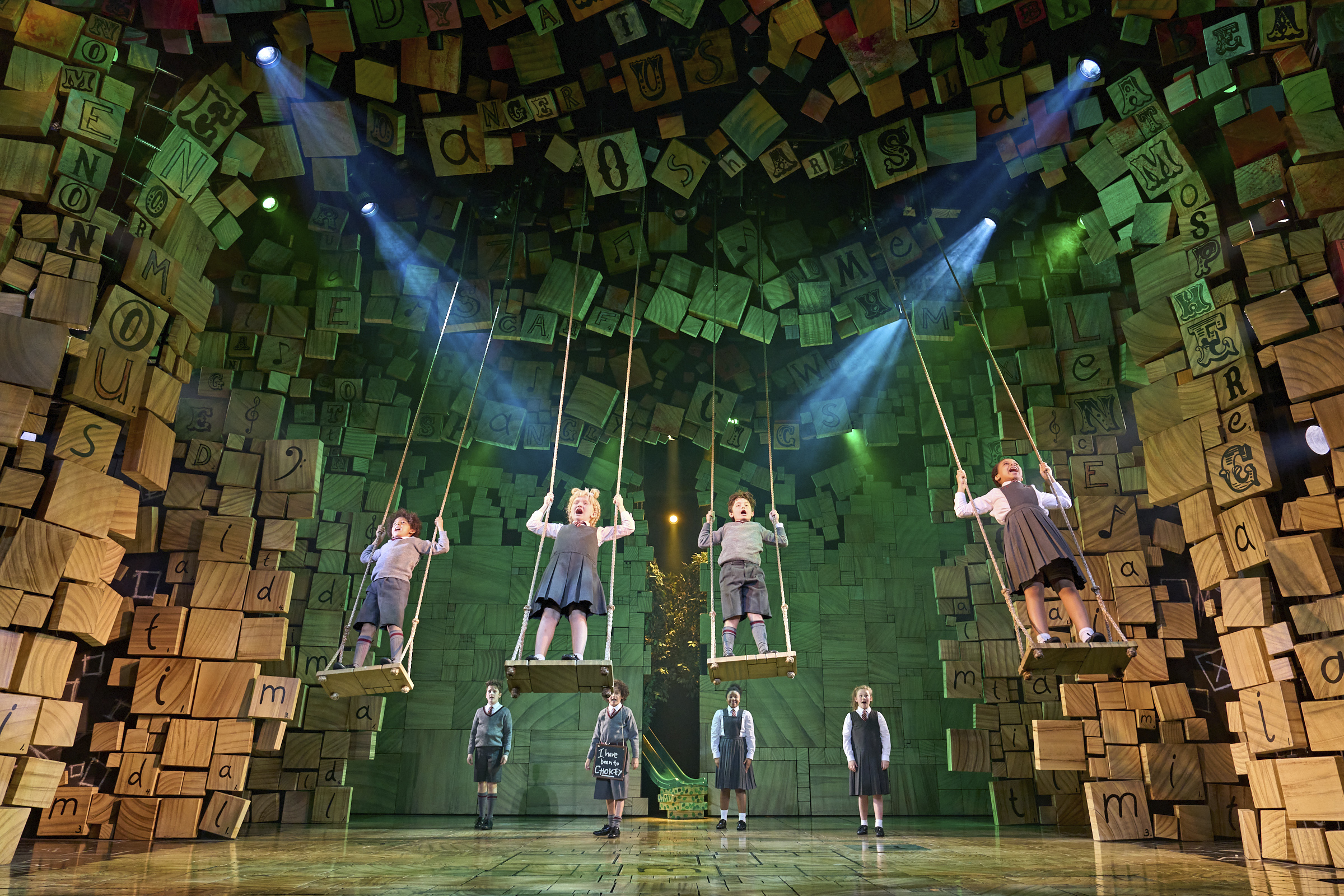photo source

My friends and I supporting our high school choreographer in Matilda | image taken by author
Are you wearing pigtails? I HATE pigtails. Go to the chokey! Welcome back maggots to another week of From Silver Screen to Spotlight: the only blog that reviews, critiques, and rates movie musicals. It’s hard to believe that we’ve already reached week eight; it seems like yesterday I was writing about Beetlejuice for our first blog post. Since this is the last post of the semester, I thought I would discuss a movie very near and dear to my heart—Matilda.
As a child, I absolutely LOVED Matilda. Growing up, it was easily one of my favorite movies and books (However, I will not be talking about the book in this blog). Seriously, I must have watched the movie at least 50 times. I remember idolizing Matilda, dreaming that I could one day be as well-read, intelligent, and insightful as this young heroine. Because the movie was such a staple of my childhood, I was unaware that there was a musical adaptation until high school. In fact, I performed in my high school’s production of Matilda in 10th grade as Mrs. Wormwood. Furthermore, my high school choreographer played Mrs. Wormwood in a professional production that I had the opportunity to see. Needless to say, Matilda holds a very dear spot in my heart, so I thought it was only right that I end on the right note (or should I say the right newt). So, grab your chocolate cake, sit next to your telly, and hold on to your super-glued hats!
Matilda the Movie
Based on Roald Dahl’s popular novel, Matilda hit the silver screen on July 28, 1966. Starring Mara Wilson in the titular role, Matilda tells the story of a gifted and bright young bookworm, Matilda Wormwood. Unfortunately, Matilda’s love for books and literature is not shared by the rest of her television-loving family. Eventually, Matilda develops extraordinary mental abilities which she uses to taunt and prank her sadistic school headmistress, Miss Agatha Trunchbull, and her neglectful and abusive parents, Harry and Zinnia. By the end of the movie, Matilda is adopted by her sweet and nurturing teacher, Miss Honey, thus giving Matilda the happy life she was deprived of.
Here is the trailer in case you have never seen the movie: https://www.youtube.com/watch?v=pnzLRDDijW0
I love Matilda. Not only is the movie a great source of nostalgia for me, but it is funny, entertaining, and empowering to children everywhere. On the surface, the movie seems harmless and innocent but at its core, it embraces a message of leadership and defiance against a universal wrong no matter how small one may be. Furthermore, it teaches children about the importance of reading and independence at a young age.
Given the age of the movie, the special effects are laughable and cheesy. With technology today, the special effects are incomparable to the CGI of movies today, but I can forgive this due to the movie’s nostalgia and age. For the most part, I think the cast is very good. Of course, I have to shout out Danny DeVito (Mr. Wormwood) for, in my opinion, carrying this movie. Not only did he star in the movie, but he narrated and directed it as well. While his character in the movie is an abusive father, he still manages to bring a great deal of comedy and slapstick humor to the role, especially when his hat gets superglued to his head. Another standout from the movie is Pam Ferris who plays the sinister and frightening villain, Miss Trunchbull. As a kid, Ferris most definitely frightened me. I remember being afraid to attend school out of the fear that my principal would act and rule just like the Trunchbull (thankfully, my elementary school principal was a Miss Honey instead). While I will not be discussing the book in extraneous detail in this blog, I will give credit to Ferris for embodying the character Dahl had envisioned in his book. Additionally, credit must be given to the costume designers and makeup artists for their excellent interpretation of Dahl’s Trunchbull and for translating his vision onto the screen. Ferris’s portrayal of the Trunchbull easily secured her place in the “Villain Hall of Fame.”
Embeth Davidtz, on the other hand, is the exact antithesis of Ferris’s Trunchbull. Davidtz’s Miss Honey is warm, genial, comforting, and loving. Her grace and elegance as the beloved teacher are evident through the screen. As a kid, I always felt Miss Honey’s presence in my living room because of Davidtz’s performance. Because the story is heavily dependent on Matilda’s defiance and rebellion against the wrong (i.e., her parents and the Trunchbull), it is imperative that Davidtz serves as the voice of reason and the vision of kindness through her Miss Honey. After all, the bond between Miss Honey and Matilda glues (no pun intended) the story together.
But of course, we cannot forget about Mara Wilson as Matilda. As a kid, I loved Wilson’s portrayal of Matilda. I wanted to be exactly like Matilda in confidence and intelligence. As someone who loved to read as a child, I looked up to Matilda a lot, and I still do to this day. However, now that I am nineteen and much more rational, I am not in love with Wilson’s portrayal of the character. From a script standpoint, I think the writers implemented a lot of detail to characterize Matilda’s confidence and intelligence, but I think that Wilson as an actress fails to portray them effectively. In fact, I find Wilson’s acting to be quite cringy, especially because of how slow she talks. Granted, she was very young in the role and is probably a much more natural actress now, but in Matilda, she seems inauthentic and unnatural at times. Don’t get me wrong, I think Wilson did a fine job. After all, she had me immersed and wooed as a child, and the movie still stands up today. However, it is a little hard for me to watch now because of her rather cringy acting at times.
For the full cast and crew, check out: https://www.imdb.com/title/tt0117008/fullcredits
The film’s story structure does a great job of integrating details from the book without being a carbon copy. As with any book-to-movie adaptions, there are of course differences, but there are not nearly as many differences between the book and movie as there are between the movie and musical (which I will get to shortly). Overall, I think the movie is fun and great for the entire family. The best parts of the movie are Matilda’s telekinesis powers which the movie exhibits beautifully. In all, it is a good, American movie!
Matilda the Musical

Image taken by author
Unlike the other musicals discussed in this blog, Matilda did not originate on Broadway. In fact, it originated in the West End in London where it performed for two years before opening on Broadway on April 11, 2013. Consequently, the musical is set in London instead of America. Therefore, the costumes, accents, and set design are all reflective of British culture. The musical ran for 1,554 performances at the famous Shubert Theatre before closing on January 1, 2017. Personally, I prefer that the musical is set in London. Roald Dahl was born and raised in the United Kingdom himself, so it would make sense that his books were too. Additionally, the London school uniforms worn by the children in the musical just look cleaner and more uniform than the mundane garb worn by the children in the movie. Plus, who doesn’t love a British accent? With the musical, audiences get an entire 2 hours and 40 minutes of British accents! But of course, the story, acting, and music are much more important than where the musical takes place.
Here is a trailer of the West End production: https://www.youtube.com/watch?v=C6y09atmhSk
Cast
I love the Original Broadway Cast (OBC) of this musical. In fact, several of the actors and actresses won awards or were nominated for their performances. This show is the definition of a well-rounded cast as half of the actors are children! Every time I watch a production of Matilda, I am blown away by the immense talent of the children, especially of the Matildas. In fact, the role is so demanding that Broadway casts four Matildas to play the role, each taking turns throughout the week. However, my two favorite actors in the OBC are undoubtedly Lesli Margherita (Mrs. Wormwood) and Bertie Carvel (Miss Trunchbull). In the musical, Mrs. Wormwood is a loud, eccentric, and angular woman in wardrobe, presence, and personality. She is obsessed with salsa dancing and being loud (verbally and physically), all of which is culminated in her belty salsa number called “Loud.” Margherita embodies Mrs. Wormwood to a tee. She completely reinvents Zinnia Wormwood from both the movie and the book into something humorous, terrible, and wonderful at the same time. In preparing for my rendition of Mrs. Wormwood, she was a very big inspiration for me. However, the best actor is hands down Bertie Carvel. Unlike the movie, the Trunchbull is played by a man which makes the character all the funnier. Throughout the musical, the shrilly, high-pitched “female” voice of Carvel is hilarious, especially when paired with his costume. You know he is a guy the entire time, but the fact that he is supposed to be a woman just makes the musical absolutely enjoyable and funny to watch.
For the Trunchbull transformation, check out Carvel’s replacement, Christopher Sieber’s makeup routine: https://www.youtube.com/watch?v=ZeRGzfCjaIY
Book/Storyline

Escapologist and Acrobat | Photo Source
Ok, here is where we see the most deviation from the movie. While the musical may start and end the same as the movie, the middle has a lot of notable changes. For starters, the character of Matilda is a lot more fleshed out. Unlike Wilson, Matilda is rebellious, confident, and unyielding to the nasty adults in her life. Furthermore, her intelligence is much more fleshed out as she often alludes to several pieces of literature throughout the entirety of the musical. Most drastic of all is the musical’s addition of the acrobat, the escapologist, and Miss Phelps. Throughout the musical, Matilda tells Miss Phelps—the librarian—about the story of the acrobat and the escapologist. However, Matilda can only tell the story in bits and pieces as she is unable to remember the entire story at once. At first, audiences think that this story is meaningless and innocent but let me assure you, everything is purposeful in musical theatre. Midway through the second act, audiences learn that the acrobat and escapologist were Miss Honey’s parents and that Miss Trunchbull is her aunt! While Miss Trunchbull being Miss Honey’s aunt is true to the movie and book, the addition of the acrobat and escapologist is a new invention of the musical. The purpose of this addition was to demonstrate a new ability of Matilda—the ability to see other people’s lives. I actually love this addition of the acrobat and escapologist because it adds more substance to the story. Every time the story is told, the audience is clued more and more into the lives of Miss Honey before they have their revelation in act two. This is definitely where I think the musical outshines the movie.
However, my biggest critique of the musical is the build-up to Matilda’s powers. In the movie, Matilda discovers her telekinetic powers about one-third into the movie. Conversely, Matilda in the musical discovers her telekinetic powers within the last 30 of the show! This is probably the most iconic part of Matilda, and yet it is heavily downplayed in the musical. Instead, the scriptwriters focused more on developing the relationship between Miss Honey and Matilda and developing the story of the acrobat and escapologist.
Score and Lighting/Set Designs
The score for Matilda is very whimsical and diverse. Songs like “Miracle” and “Naughty” are very childlike in nature which, of course, is fitting since it is a children’s show. However, songs like “The Chokey Chant” and “School Song” are much darker to emphasize the darkness of the Trunchbull’s school. Then, of course, you have your sad songs like “Pathetic” and “My House” that draws out the emotion of the audience. Finally, you have your upbeat songs like “Loud” and “Revolting Children” that make the entire audience want to dance. Overall, it is a very well-rounded score that brilliantly reflects the emotions of the show.
Listen to the entire soundtrack here: https://www.youtube.com/watch?v=nc6KlN1q-uU&list=PLPPRtvSP8agVEiyjUFmwisvqXxysJeLRK
Like the score, the lighting reflects the emotion of the scene. At school, the lighting is dark and sinister to reflect the frightening nature of the Trunchbull. When Matilda is reading though, the lighting is bright and cheery to symbolize Matilda’s joy of reading. Like the lighting design, the set design is very whimsical. Throughout the set, large scabble-like letter blocks adorn the stage to spell out words. I love this set design because it masterfully embodies Matilda’s love for reading.
Movie or Musical?
So, which version of Matilda is being sent to the chokey? As any book reader would say, the book is obviously superior to both the musical and the movie. But since we are not talking about the book in this blog, I would say that the musical is better. While the lack of telekinetic powers does bother me, I prefer the musical’s more-developed storyline to the movie. Furthermore, Matilda’s characterization in the musical embodies a stronger sense of confidence and self-determination than in the movie. Matilda will always be nostalgic for me, but the musical simply takes Bruce’s chocolate cake.
If you want to see the musical for yourself, check out the movie coming to Netflix at the end of this year! It is the entire stage musical shot as a movie musical!

Image taken by author
Here is the trailer:
Here is the trailer for the Netflix version coming out on December 25, 2022: https://www.youtube.com/watch?v=mEEMbNS6fzY






I have actually never seen the musical adaptation of Matilda, so I am very intrigued by the praise you have given it. It has been on my list of musicals to watch for a while, so maybe I’ll finally get around to it now that I know that it is possibly better than the movie. I, too, loved the movie as a child. I was absolutely obsessed with it for a little while. I haven’t rewatched it in years, but I understand what you mean with the almost cringy portrayal of the main character. It always bothered me how slow she talked, but I just chalked that annoyance up to my short attention span. I’m delighted to know that I’m not the only one who had a problem with it. I think next time I put on a movie while I eat dinner, I might have to find a bootleg of Matilda and finally watch the musical. From what you’ve said about it, I’m sure I’ll enjoy it.
Also, I wholeheartedly agree that the book cannot be topped
I am so excited you chose to write about Matilda. I also grew up adoring the book and movie and just anything else by Roald Dahl. I had no idea it was made into a musical until my cousin was in a production of it. I completely agree, the musical captures elements of the story that are not easily seen in the movie. The songs are so catchy, and the set is gorgeous.
This is very interesting! I didn’t know Matilda had such a rich history in the musical realm as well. I really do think the depth of child actors and the fact that it seems that they have great acting talents is impressive. Matilda is one of the literary classics of our time, and it is nice to see that justice is being done for it in a major way when it comes to the musicals which seem to be more detailed and innovative.
I absolutely loved reading this blog post. All the insightful information was really entertaining and exciting to read. I agree with you – the musical is better. You clearly explained both to a tee, and made me fall in love with Matilda all over again. I will definitely have to watch it when it comes out on Netflix because this is one of my favorite scores for musicals.